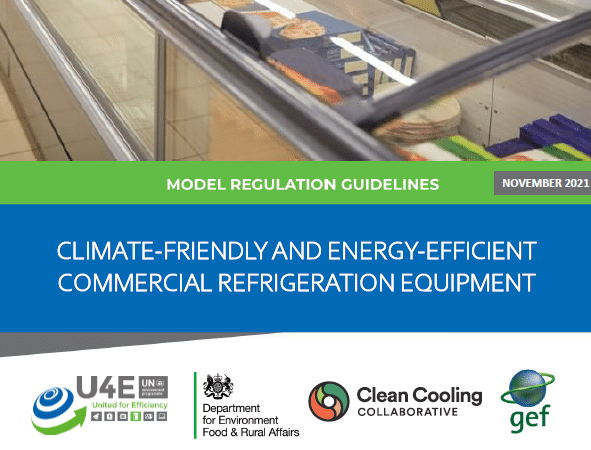The United Nations Environment Programme’s United for Efficiency initiative (U4E) and Lawrence Berkeley National Laboratory today launched Model Regulation Guidelines for commercial refrigeration with the potential to save annual greenhouse gas emissions equivalent to 65 power plants – helping to back the stronger climate action needed to ward off the worst impacts of climate change.
The Guidelines are consistent with the COP26 Product Efficiency Call to Action and the Super-Efficient Equipment and Appliance Deployment (SEAD) initiative, under which governments, business, non-governmental organizations and consumers are working to double the efficiency of lighting, refrigerators, air conditioners, and electric motors globally by 2030.
“The contents are based on global best practices and market trends and so provide a solid starting point for policymakers who are pursuing their first regulations or incentives, or updating existing programmes,” said Brian Holuj, U4E’s project lead for developing and deploying the guidelines. “We look forward to putting the contents into practice with interested officials and delivering results far faster and more easily than business-as-usual.”
The aim is to help countries implement robust policies to accelerate the transition to energy efficient and climate-friendly cooling technologies. They can be applied through voluntary financial mechanisms as well as regulatory programmes in developing and emerging economies. They are already set to be deployed through a variety of projects.
Alexandra Maciel of Brazil’s Ministry of Mines and Energy said, “Our Ministry is proud to have served as a contributor to the development of the new Guidelines. We look forward to partnering with U4E to implement them in Brazil and share our experience more broadly to encourage other countries to do the same. It is a great way to leapfrog to more sustainable cooling, save electricity and money, and reduce our footprint on the planet.”
The guidelines are designed for adoption by developing and emerging economies and entry into force as soon as 2024, depending on local circumstances. Interventions for commercial refrigeration are generally rare in these markets, which tend to focus on lighting and household appliances. Moreover, inadequate enforcement leaves countries vulnerable as dumping grounds for equipment that cannot be sold elsewhere.
Nihar Shah, Presidential Director of the Global Cooling Efficiency Program at Lawrence Berkeley National Laboratory, reflected, “Minimum Energy Performance Standards (MEPS) and energy labels, if well-designed and implemented, are some of the fastest and most effective approaches to improve efficiency and reduce emissions. With a clear set of common requirements underpinned by technical supporting information on market and policy trends, the new Guidelines can accelerate policy adoption and ease enforcement.”
Typical commercial refrigeration equipment requires electricity and a refrigerant gas to operate. When electricity comes from fossil fuel power plants – which is the case for nearly 75 per cent of the electricity in non-OECD countries – greenhouse gases and air pollution are emitted.
Many refrigerants have a global warming potential (GWP) that is well over 1,000 times as potent as an equivalent molecule of carbon dioxide. Technologies are widely available to improve energy efficiency and use refrigerants with lower climate impacts. The guidelines include both recommended energy efficiency levels as well as refrigerant GWP limits.
“Intervention is needed to avoid lock-in to climate polluting, inefficient cooling technologies in developing countries, and these new tools provide vital support to deliver accelerated hydrofluorocarbon reductions while improving energy efficiency,” said Steve Cowperthwaite of the UK’s Department for Environment, Food and Rural Affairs, who supported the project. “We are delighted to provide further funding for U4E’s technical assistant to implement the contents in interested countries as part of Defra’s support for integrated action on sustainable cooling.”
As of a decade ago, about 120 million commercial refrigeration equipment units were in operation globally. A 2019 study estimated that energy consumption in cooling products in China accounted for more than 15 per cent of total national electricity consumption and that the commercial refrigeration equipment market is growing at an annual rate of 5-30 per cent.
For more information, contact:
Brian Holuj
Programme Management Officer – United for Efficiency (U4E)
Global Climate Action Unit
United Nations Environment Programme
brian.holuj@un.org
